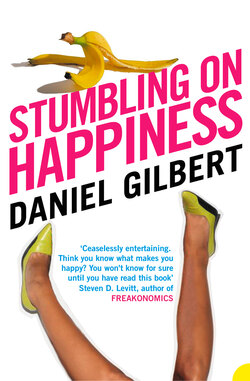Читать книгу Stumbling on Happiness - Daniel Gilbert - Страница 23
Feeling Happy About
ОглавлениеThe you-know-what-I-mean feeling is what people ordinarily mean by happiness, but it is not the only thing they mean. If philosophers have muddled the moral and emotional meanings of the word happiness, then psychologists have muddled the emotional and judgmental meanings equally well and often. For example, when a person says, ‘All in all, I’m happy about the way my life has gone’, psychologists are generally willing to grant that the person is happy. The problem is that people sometimes use the word happy to express their beliefs about the merits of things, such as when they say, ‘I’m happy they caught the little bastard who broke my windshield’, and they say things like this even when they are not feeling anything vaguely resembling pleasure. How do we know when a person is expressing a point of view rather than making a claim about her subjective experience? When the word happy is followed by the words that or about, speakers are usually trying to tell us that we ought to take the word happy as an indication not of their feelings but rather of their stances. For instance, when our spouse excitedly reveals that she has just been asked to spend six months at the company’s new branch in Tahiti while we stay home and mind the kids, we may say, ‘I’m not happy, of course, but I’m happy that you’re happy.’ Sentences such as these make high school English teachers apoplectic, but they are actually quite sensible if we can just resist the temptation to take every instance of the word happy as an instance of emotional happiness. Indeed, the first time we utter the word, we are letting our spouse know that we are most certainly not having the you-know-what-I-mean feeling (emotional happiness), and the second time we utter the word we are indicating that we approve of the fact that our spouse is (judgmental happiness). When we say we are happy about or happy that, we are merely noting that something is a potential source of pleasurable feeling, or a past source of pleasurable feeling, or that we realize it ought to be a source of pleasurable feeling but that it sure doesn’t feel that way at the moment. We are not actually claiming to be experiencing the feeling or anything like it. It would be more appropriate for us to tell our spouse, ‘I am not happy, but I understand you are, and I can even imagine that were I going to Tahiti and were you remaining home with these juvenile delinquents, I’d be experiencing happiness rather than admiring yours.’ Of course, speaking like this requires that we forsake all possibility of human companionship, so we opt for the common shorthand and say we are happy about things even when we are feeling thoroughly distraught. That’s fine, just as long as we keep in mind that we don’t always mean what we say.
